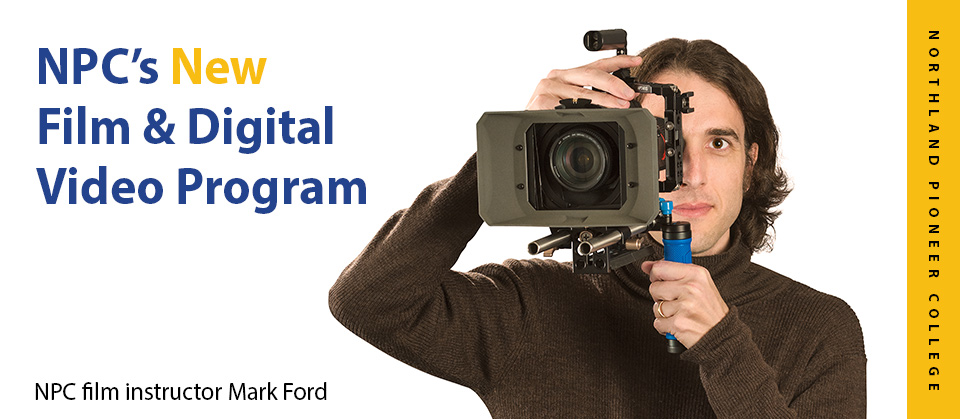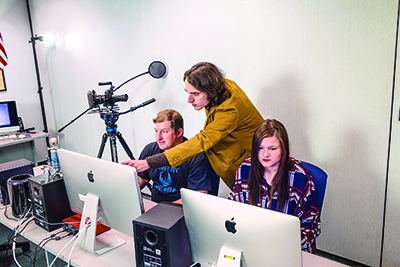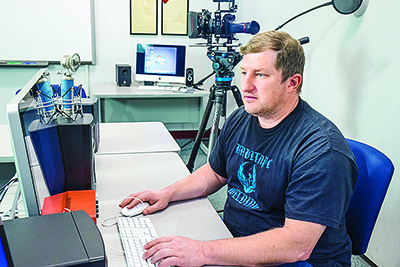Today, digital media is everywhere and film and sound production are no exception. That’s why Northland Pioneer College is creating a new Film and Digital Video (FDV) program taught by international award-winning filmmaker Mark Ford.
To create the Film and Digital Video program, Ford has revamped and updated two existing NPC courses, and added several new ones, to incorporate the latest technology and software for video and audio editing. “Students can earn an Associate of Applied Science degree in Film and Digital video at NPC and then, if they want to continue their studies at a four-year university or film school, they’ll have the hands-on experience to succeed,” explains Ford.
Definitely more comfortable behind than in front of a camera, Ford brings his award-winning craftsmanship to NPC’s new program. With a bachelor of arts degree in film from Indiana University and a master’s degree from Syracuse University, he has taught media arts for over a decade.
His accolades also include nominations for the Golden Bell, Taiwan’s Emmy, and the Golden Horse, the Pan-Chinese Oscar. He’s worked extensively with filmmaker Lee Chi-Yuan and was on the creative team for Tsai-Ming Liang’s Stray Dogs, winner of numerous international awards in 2013.
Ford often co-directs with his wife, Mei-Fang Hu, who arrived in the U.S. in February with their two bi-lingual children, ages 5 and 1. The couple share numerous credits, including the short film Run Away Home, winner of the 2002 Humboldt International Film Festival, the 10-part documentary series Taiwan Fans, released in 2008, and the feature-length documentary Ripples Apart, which will be screened internationally this year.
He has traveled extensively and filmed documentaries in the United States, China, Japan, India, Cambodia, New Zealand, and Great Britain. He lived and worked in Taiwan for 10 years before returning to northeastern Arizona. Ford fell in love with this region shortly after graduating from film school when he lived in Gallup and Navajo, New Mexico.
Where are the jobs for digital video graduates?
You don’t have to move to Hollywood to be successful in the film industry. Today, with the relatively low cost of technology, a feature film can be made anywhere. As the equipment gets smaller and less expensive, there’s more opportunity to create high-quality videos for a local band, business, wedding or event.
With the increased integration of digital audio and video on the Internet as streaming media, Ford sees movement of the arts into the digital realm, encompassing other areas, such as computer-generated art forms.
Success in the field is all about doing a good job, word of mouth, and networking. Most film and digital video graduates will begin as an assistant for an editor, director, producer, or camera person. Ford encourages students to practice on their own by producing short films, editing, or shooting to get a solid feel for their given craft.
Becoming a good video editor requires lots of practice.
Anyone can acquire the technical know-how but a good editor must have an understanding for the rhythm and construction of a series of visual images. These images will ultimately unite the script with the final direction of any piece. It’s learning to “feel” the pacing and the rhythm of the piece.
For anyone interested in video editing, he would strongly encourage them to purchase or borrow Adobe Premiere Pro (available for Mac or Windows for less than $50 per month) or Final Cut Pro (available for Mac and Windows for around $300) and edit everything and anything in sight, such as home movies, stock footage, movies or TV commercials. Students enrolled in NPC’s program will work with Adobe Premiere Pro.
What kind of salary can a graduate expect?
The Phoenix area is the nation’s eighth largest employer of camera operators in television, video and motion pictures. According to the U.S. Bureau of Labor Statistics, the average annual salary for a camera operator is $42,610, and a film or video editor averages $52,700. Depending on how good you are and what kind of contacts you’ve made, the sky’s the limit.
Currently, Arizona relies on municipal offices and commissions around the state to work with the film industry. “Most active are Page/Lake Powell, Flagstaff, Prescott, Phoenix and Tucson,” explains Heather Ainardi, Marketing and Public Relations Manager for the Flagstaff Convention and Visitors Bureau. “We mostly get commercials and documentaries filmed in Flagstaff because of the location.”
How do I know if filmmaking is right for me?
Ford uses himself as an example. He thought he wanted to study journalism, but on a whim, he signed up for an Introduction to Film course. “Things just ‘snapped’, and I knew that’s where I wanted to concentrate my studies,” said Ford. “Filmmaking has so many components, it’s sometimes hard to imagine what’s involved. Try out NPC’s introductory course (FDV 150) and see what it’s all about.”
In the introductory course, students explore the history of film and filmmaking from a viewer’s perspective. Film Aesthetics looks at the techniques used by the director. Both of these courses will be on the college’s interactive technology network, making them available at multiple NPC locations.
Then there are the hands-on courses in video production, editing, audio – both capturing and post-production – and screenwriting. In the application courses, students learn about pre-production and budgeting, and work either individually or as a group on production and post-production of a film project.
Current student Mike Shriver:
“I’ve been interested in film for a long time,” said Intro to Film and Editing student Mike Shriver. “Mark has a great deal of knowledge about the film industry and he brings that into the classroom. I have some knowledge of electronics and sound editing, which has helped me a lot in his classes. Yet I have learned even more from Mark.”
Shriver considers himself a hands-on learner and Ford’s classes use that method. “His classes are designed to help even the least technological person understand.
He encourages hands-on experience with the equipment and software. He is very patient with those in his classes, but most of all he encourages his students to have fun.”
A Performing Arts student, Shriver plans to take additional FDV classes in the future. “I look forward to increasing my knowledge of sound and film editing. I hope to get a job in sound editing in the film industry or wherever it takes me.”
Can high school students take these classes?
Ford plans to work closely with area high schools that already have audio/video-related programs (Holbrook, Winslow, Snowflake and Show Low), building a strong partnership that gives high school students the opportunity to pursue their interests in filmmaking and editing and even complete their two-year degree at NPC. Last fall, there were 133 high school students already enrolled in these video programs.
Two or three NPC film and digital video courses will be offered each semester through the Northern Arizona Vocational Institute of Technology (NAVIT) at area high schools as dual credit courses. “Additional courses can be developed if there is interest in advanced work in sound, lighting and special topics, such as music videos,” noted Ford.
Some lecture/lab FDV classes will be offered in Show Low and possibly Holbrook. The program will primarily be based at the Performing Arts Center on the Snowflake campus.
– Everett Robinson




